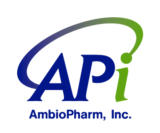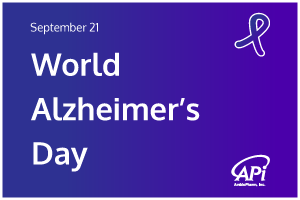First published Sept 21, 2023, updated June 7, 2024.
September 21st marks World Alzheimer’s Day, an effort to bring more attention to the devastating disease. Alzheimer’s disease is a chronic neurodegenerative disease affecting more than 6 million people in the United States alone. In 2019, it was the sixth leading cause of death in the United States (and seventh leading cause in 2020 and 2021, due to COVID19 taking the third position). It is estimated that Alzheimer’s disease and other dementias will cost $345 billion in medical care in 2023.
Extracellular amyloid plaques, caused by the Amyloid β-Protein, and intracellular neurofibrillary tangles are hallmark features of the disease. The buildup of plaques in the brain from Amyloid β-Protein, most notably peptide fragment Aβ 1-42, cause inflammation and neurodegeneration. Alzheimer’s disease is a progressive brain disorder that causes problems with memory, thinking, and behavior1.
It is a tough disease to treat, but there have been recent approvals for treating Alzheimer’s disease including lecanemab (Leqembi®) and aducanumab (Aduhelm®); however, Aduhelm® will be discontinued in 2024.2 There are also 127 drugs in clinical development, many of which aim to prevent disease, delay onset, slow progression, or improve symptoms. Diagnostics aimed at earlier identification of the disease are also in development, including some that identify early biomarkers of the disease or others that include imaging.3,4
References
- http://www.alz.org/facts/
- https://www.alz.org/alzheimers-dementia/treatments/aducanumab
- https://www.ncbi.nlm.nih.gov/pmc/articles/PMC9066743/
- https://www.mayoclinic.org/diseases-conditions/alzheimers-disease/in-depth/alzheimers-treatments/art-20047780
Additional reading:
Preventing Alzheimer’s Disease: What Do We Know?
Alzheimer’s disease drug development pipeline: 2024
Alzheimer’s disease drug development pipeline: 2023
Alzheimer’s disease drug development pipeline: 2022
A new peptide may hold potential as an Alzheimer’s treatment
Peptides as Potential Therapeutics for Alzheimer’s Disease
The Alzheimer’s disease drug development landscape
Q&A: How a potential treatment for Alzheimer’s disease could also work for Type 2 diabetes
LEQEMBI® is a registered trademark of Eisai R&D Management Co., Ltd. ADUHELM ® is a registered trademark of Biogen.

 中文
中文